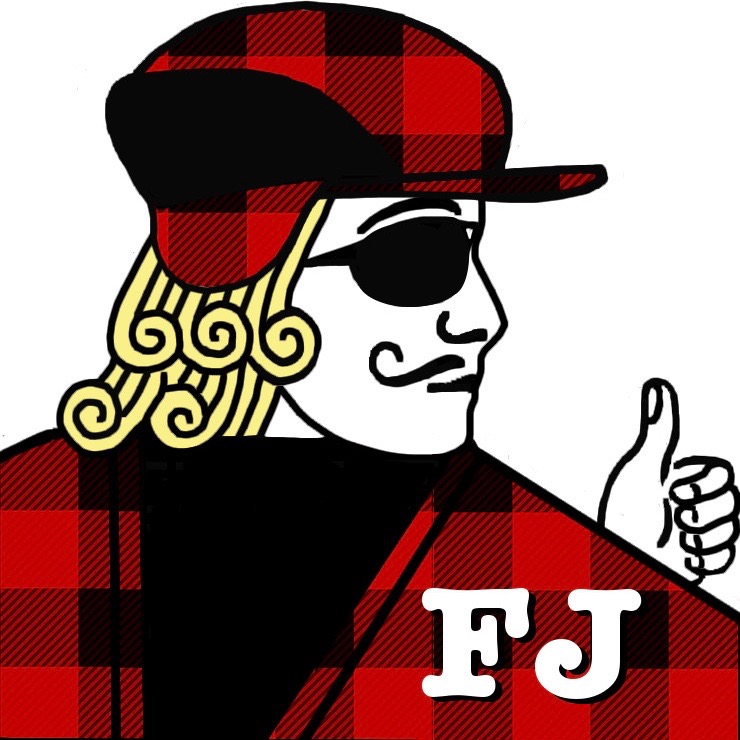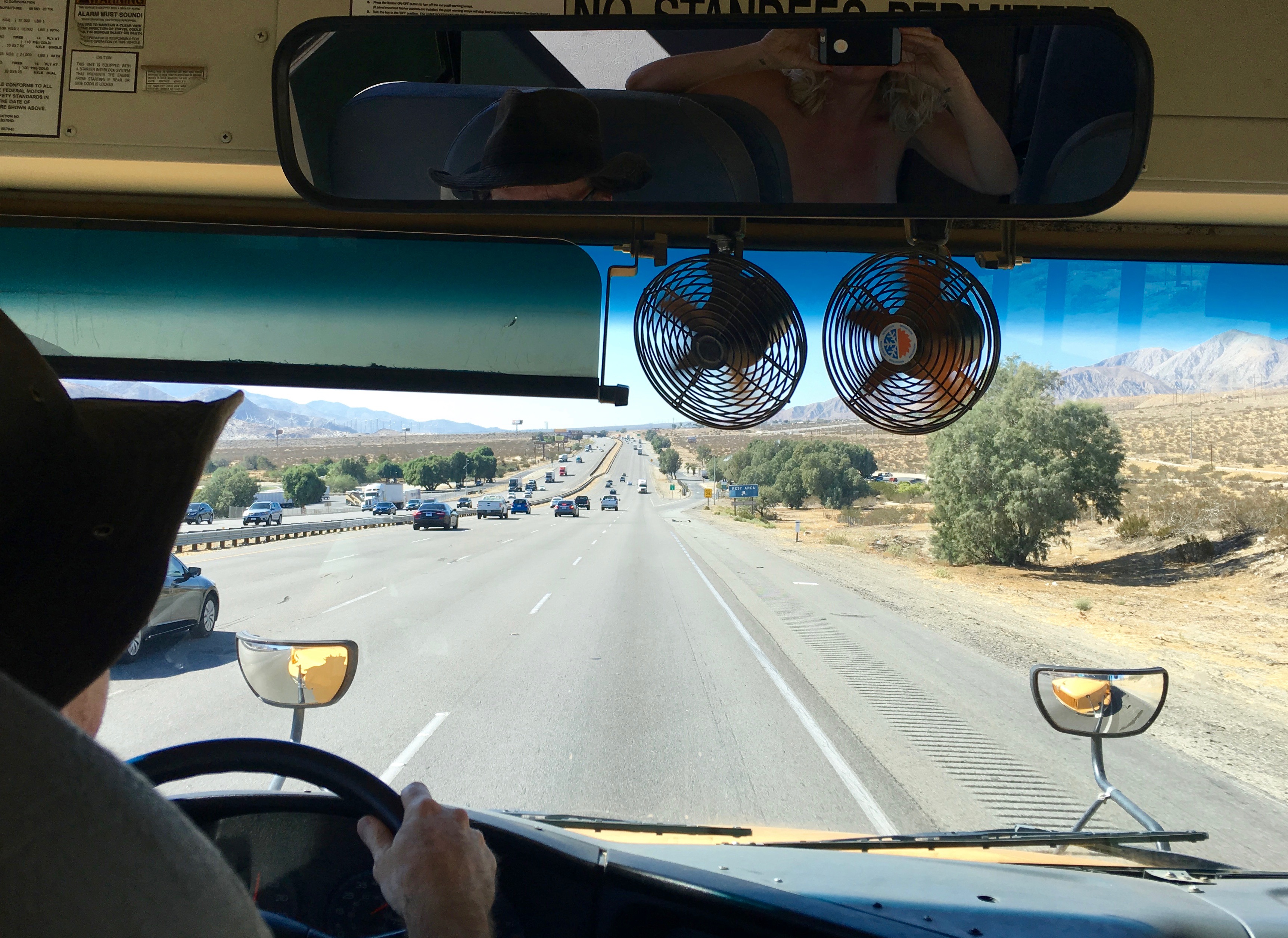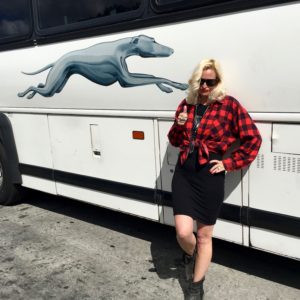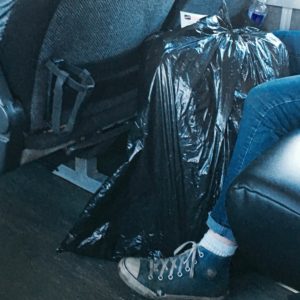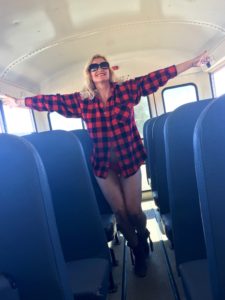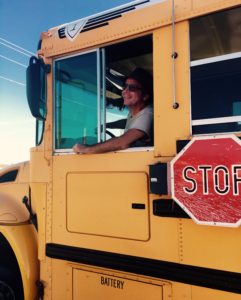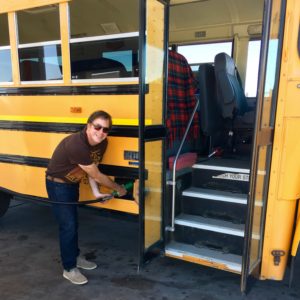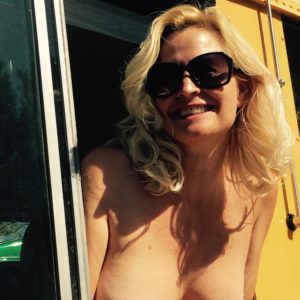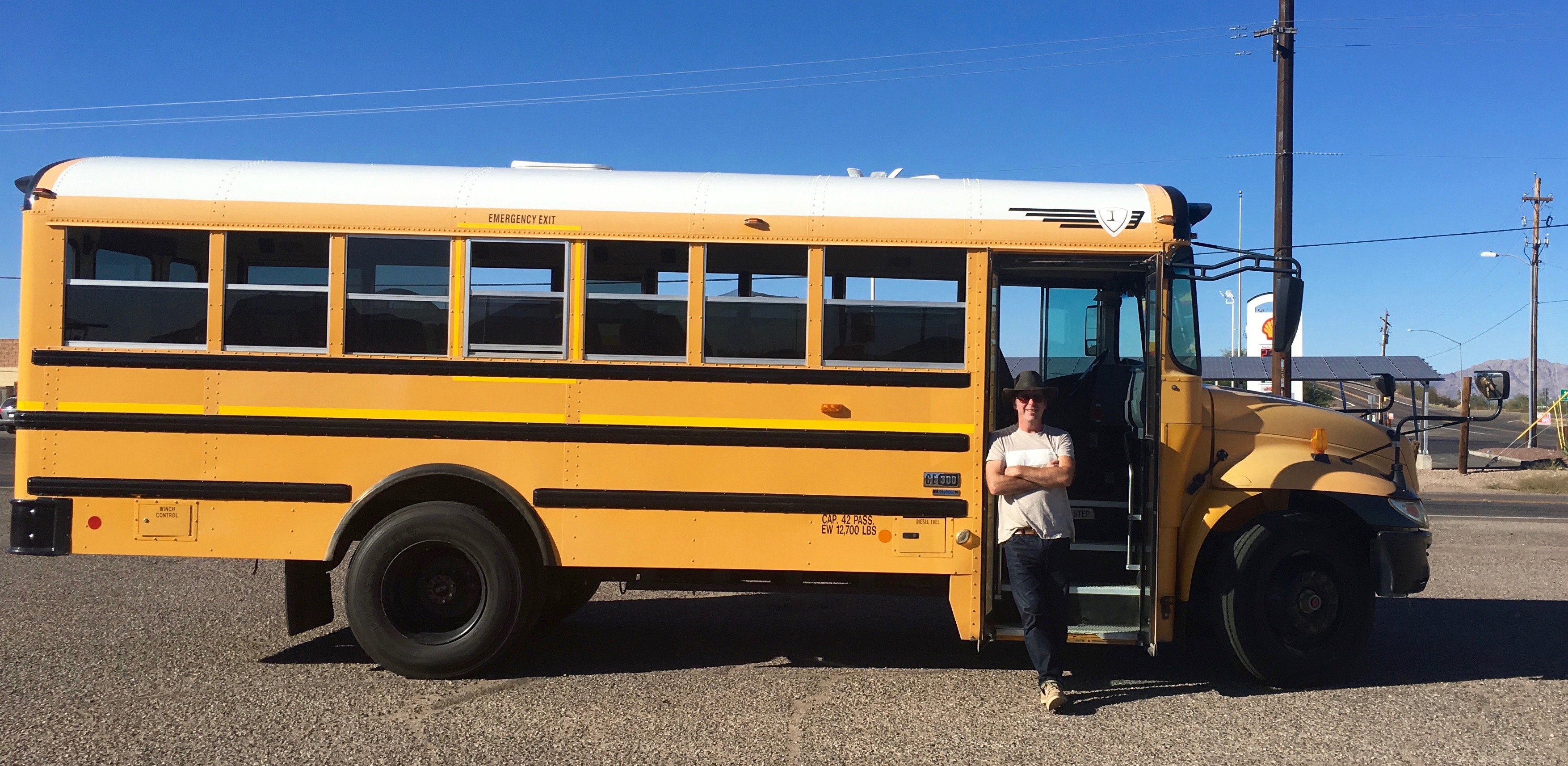The Greyhound ads didn’t look so bad. Free wi-fi. TVs. I can watch the Eagles game. “Um, ever ride a Greyhound?” Camping Kitty asks. “I’m thinking they haven’t changed all that much.”
Turns out, Kitty’s family rode Greyhounds all the time. That was their hippie mode of long distance travel. She tells me a few childhood stories about the strangers she had to sit with for 12-hour stretches, before I stop her. Save some. It’s more than 400 miles and 10 hours to Phoenix to pick up our used school bus, but we better get used to being together on a bus.
My armrest falls off once I sit down and the wifi fades away with the bus station. The TVs never flicker. I’m relegated to people watching before we even get out of Downtown LA. In the seat across the aisle from me, a woman has all her belongings stuffed into a green 50-gallon trash bag. “She got that from the in-drive magazine,” I joke with Kitty. “It’s the Greyhound luggage collection.” Moments later, another passenger walks by with a plastic grocery bag. “He went for the Carry-on.”
Greyhound drivers have seen it all. For a $35 fare to go 2,000 miles, they’re not moving the travel elite. This guy up front in the navy blue uniform is no nonsense. “You’re going to exit the bus calmly and you’re going to stand behind the yellow line,” he announces before our first stop. “You’re going to board the bus within 15 minutes or we will leave without you.”
I turn to Kitty: “You’re going to approach the stall calmly and pee into the toilet efficiently.”
She’s thumbing through a worn copy of Tom Wolfe’s The Electric Kool-Aid Acid Test and reads me a Ken Kesey quote from Chapter 6 (fittingly titled “The Bus”):
“There are going to be times when we can’t wait for somebody. Now, you’re either on the bus or off the bus. If you’re on the bus, and you get left behind, then you’ll find it again. If you’re off the bus in the first place — then it won’t make a damn.”
Kesey was talking about more than The Merry Pranksters’ bus, of course, speaking allegorically to an expanded consciousness and group enlightenment. I think our Greyhound driver is saying something different, not so concerned if we’re with the times or part of the group mind, he’s saying if we’re not back in time we’ll be left in San Bernardino.
Outside the Greyhound station, Kitty and I stretch out in the parking lot off North G Street and listen for the hushed calls of the driver. She’s a few feet away from me. Her blonde hair looks radiant in the afternoon sun, brighter still where it falls over her shoulders covered in a dark red-and-black classic flannel. Her shirt is cinched at the waist, over her black skirt and boots. It isn’t long before she attracts some attention. A man on a bicycle rolls up and asks where she’s from. She looks like she dropped out of a photo shoot. I’m waiting to see what this guy’s game is when another, shadier and shirtless dude walks up to me.
“You like pot?” he asks. “I mean, do you like weed? Want to go buy some weed?”
I tell him no and he turns his attention to Kitty. “How about you, Marilyn? You want to get down with some weeeeed?”
“We’re good.” I tell him.
“Oh, she’s with you,” he says. “Dudes always get nervous when I talk to their girls.”
He’s holding a plastic bag with undisclosed contents. Seems he went for the Greyhound carry-on case too. I motion to Kitty that it’s time to go. Behind us, everyone’s already getting back on the bus.
“Dude, you gotta relax,” bicycle dealer chastises shirtless dealer. “Work on your game. You’re way too aggressive.”
Back on the bus, Kitty reads me another passage from Electric Kool-Aid, describing how their converted school bus “Further” came to be. It was named by artist Roy Sebern, a one-word poem to inspire them to keep going whenever the bus broke down. We start throwing possible names for our own bus back and forth as darkness falls, along with it, the energy of everyone inside the bus. Kitty’s reading light is the last one on in an otherwise dark and silent bus.
“Do you really need that on?” the guy in front of her asks. He’s annoyed. Maybe not a Tom Wolfe fan. Begrudgingly, she shuts it off and leaves Wolfe’s eloquent prose to marinate another day. We’re all sitting in darkness when a waft of exhausted Mexican food sucks up all the fresh air. No wonder he wanted the light off, seeking anonymity before launching a bus bomb of ass and beef Gorditas from the last food stop in Blythe.
“Yankee Doodle Dog!”
With no clue how we started playing this, Kitty and I take turns inserting the word “dog” into phrases, compound words, anything really.
“Good dog, sunshine,” she counters.
“Have a nice dog.”
“So many dogs so little time.”
“Hot dog.”
It’s ridiculous and nonsensical and we can’t seem to stop, cracking canine back and forth for 20 minutes … 30 minutes … 40 … We have no idea what the rules are. Are there rules?
“The judges are giving me Zippity do-dog”, I say, laughing in the dark as we begin to roll again through Arizona. It must be annoying to anyone within earshot. The guy in front digesting Gorditas probably regrets asking us to turn off the lights and stop reading.
“Wait!” Kitty says with urgency. “Did I already use ‘Dipping Dogs’?”
She had.
* * *
There’s a cab with its light on outside the Phoenix Greyhound station, but the driver is nowhere to be seen. “Oh wait, he’s here,” I say. “He’s lying down. I think he’s asleep.” The driver kindly puts his seat up so I don’t have to chin my knees and we head for The Mariott Hotel. He has no idea where he’s going, but he’s playing an ’80s station on the radio and everything’s all right. John Waite has full-throated accompaniment in the backseat of a Phoenix cab just before midnight.
“I ain’t missing you at all,” we sing at the top of our lungs, keeping our driver awake. “Since you’ve been gone … away!” We feel good being out of the Greyhound bus. We’re not leaving the driving to them anymore, we’re settling into the driver’s seat of our own lives, taking the wheel of our own tomorrow.
We check into our hotel, share a bath and go to sleep dreaming of the adventure to come.
* * *
Our bus is already rumbling when we pull into the dealer’s lot on the outskirts of North Phoenix, that 2009 International, 15-ton beast sits idling, waiting to start storming the nation’s highways and forgotten paths with us aboard. We feel connected immediately with our new ride. Whatever anxiety I had about getting back behind the wheel evaporates in the morning sun. I thought I’d be nervous, need a learning curve again, need to go slow along less populated side streets and abandoned strip mall parking lots to get my bearings. But after we sign the papers and I slide back into the driver’s seat, it feels like coming home.
We head straight for the highway to pick up where we left off more than a month ago, when we thought we’d never see it again.
But first, we need gas. Diesel and lots of it. We get cross looks from the first station we pull into and I realize diesel may not be as easy to find as I hoped. We pull into a second station, no dice. Kitty leaves to go buy some drinks at the mini market while I look online for a diesel pump. From my elevated view, Kitty looks adorable out in the parking lot in her blue sundress, and also like she was dropped from outer space. It’s like The Walking Dead out there with aimless stragglers stumbling in different directions like zombies. Shirtless zombies. They all have their shirts off and carry Greyhound carry-on (plastic) bags. I keep a watchful eye on her and on the schizophrenic yelling at the back side of the bus, something about “not feeling guilty.” Must’ve went to Catholic school.
Back behind the wheel and rolling west on I-10, it feels like home. Rumbling headlong into the long, hot desert, the two of us are beaming. We’re alive, and celebrating it every mile. There’s a profound happiness, a joy, reverie. Before long, Kitty is giving me a show in my rear-view mirror. She’s topless and dancing up and down the aisle, dipping between the seven empty rows of seats. Our rows of empty seats, the ones we’ll be pulling out and replacing with a home. She is joy incarnate and I can’t wipe the goofy grin from my face.
There’s a kinship with truck drivers sitting this high up above the road. We thunder along, steady and powerful, while the little cars down below zoom in and out of lanes like gnats, swerving out of the way just before you swat them, only to cut back in front of you doing 70 in a 30,000-pound beast of rolling steel. But you can’t worry about them, they’ll swerve. We just have to keep on keeping on, motoring across the desert.
Up high, you see the whole road open up before you, the landscape changing ahead. With windows in every direction, we are part of the landscape as we roll through it — no AC, no radio — just the road and us (and Kitty’s bouncing tits). The gnats all seem so removed from this experience in their air conditioned cars, low to the ground, the only real landscape before them the other zooming gnats and the raging diesel animals that push them out of the way.
Who wants to go back to driving a milk white RAV4?
No, this Monday morning, everything seems right with the world. Our world. We’re driving home, but already feel as if the great adventure has begun.
* * *
Just before sunset, we roll back into Blythe on California’s eastern border. Back in the The Golden State, we check into a Red Roof Inn and walk to Wang’s for come celebratory Cashew nut chicken and Sapporos (yes, I know they’re Japanese beers). But the mood changes at the table and Kitty seems sad.
“It’s as if I feel guilty for feeling so happy,” she says. I put my arm around her and we walk back to the hotel, stopping on the steps just outside our door. With no 30-foot long spaces, I left the bus in the middle of the parking lot, as if on display in an open-air showroom. It looks coiled and ready to pounce just sitting still, like it can’t wait to hit the highways again in the morning. Or maybe it’s just us. We watch the bus in the fading light with the same dreaminess we did the first time we laid eyes on it. This time it’s ours, and we’re bringing it home.
“I feel so free,” I tell Kitty. “Letting go of my job and money worries, figuring out things as I go. Knowing I’ll figure them out.”
A few weeks before, I was parked on the side of the road in Topanga, California talking on the phone with my sister Jen, she doing the same on a side street on the other side of the country in Philadelphia. Her voice was strained, her words rushed to the degree she couldn’t pause long enough to listen. She was harried, stressed, an emotional wreck. I just listened to her talk about getting screwed out of clients at her newspaper sales job. She wants to quit. I tell her she should.
“I’m probably going to lose my job in a couple weeks,” I said.
“Aren’t you scared?”
I wasn’t. I was excited. There was a sense of calm as rain pattered on my RAV4 windshield, having let go of the job in my mind well before. “Not really,” I told her. “It’s the opposite.”
“I’ve never seen anybody really find the answer, but they think they have, so they stop thinking,” Ken Kesey wrote. “But the job is to seek mystery, evoke mystery, plant a garden in which strange plants grow and mysteries bloom. The need for mystery is greater than the need for an answer.”
We’re embracing the chaos now, ready to live on the road and deal with what may. It’s when you think you have everything figured out, all your bases covered, that you don’t allow room for anything new in your life.
“I feel like we’ve tapped into something,” I say to Kitty.
“We’re in the driver’s seat of our own lives,” she says.
